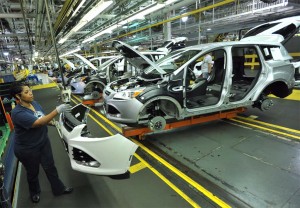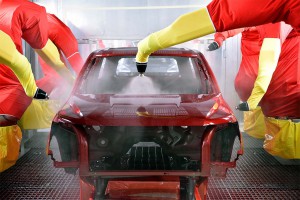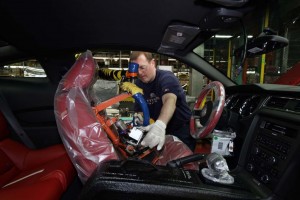
Ford is cutting one shift at the Louisville Assembly Plant, but moving those workers to the Kentucky Truck Plant.
On the heels of General Motors’ announcement that it plans to shutter five plants in North America, Ford Motor Co. said it expects to reduce production at two key U.S. assembly plants by next spring.
However, mindful of the harsh political fallout that followed the GM announcement, including a series of angry tweets from President Donald Trump, Ford took pains to emphasize that workers displaced by the impending cuts at assembly plants in Louisville, Kentucky, and Flat Rock, Michigan, will be offered jobs at nearby Ford plants.
No workers will be laid off during the changes, which are scheduled to take place next spring, Ford spokeswoman Kelli Felker stressed in an e-mail to TheDetroitBureau.com.
In a statement, Ford said workers from the Louisville plant will go to work at another Ford plant that builds full-size sport-utility vehicles.
(Trump threatens GM with economic sanctions. Click Here for the story.)
Ford is adding more than 500 jobs at Kentucky Truck Plant, or KTP, and moving approximately that same number of jobs from Louisville Assembly Plant to nearby KTP to increase Ford Expedition and Lincoln Navigator production by 20%.
The Louisville plant, which now operates on three shifts, will move to a two-shift operating pattern next spring. Ford is adding approximately 500 jobs at its Livonia (Michigan) Transmission Plant, which builds transmissions for a number of vehicles, including the Ford F-150 and Ford Ranger.
Most of those employees are expected to move from Flat Rock Assembly Plant, which will move to a one-shift operating pattern next spring. The Flat Rock plant builds the Ford Mustang.
Ford had once hoped to increase exports of the Mustang to China, but the plan has been stymied by the escalating trade ware between the U.S. and China.
Ford, which like GM, has been under pressure to increase the value of its common stock, noted the shift also follows the underlying shifts in preferences of American consumers, who have shown a distinct preference for larger SUVs and pickup trucks.
“To meet strong customer demand for our full-size SUVs and trucks, Ford is rebalancing production at some of our U.S. plants, further increasing our efficiency while retaining jobs for all full-time hourly employees. Ford Expedition retail sales are up 36% from one year ago, while Lincoln Navigator sales are up more than 80% from one year ago.
(Click Here for more about Ford partnering with Walmart on autonomous deliveries.)
“F-Series is the best-selling vehicle in America, with sales up 2% and outselling the second-place competitor by approximately 280,000 vehicles through October. In addition, we have a new Ford Ranger coming to dealerships early next year,” the statement noted.
The new Ranger is being built at a Ford assembly plant in Wayne, Michigan, which has been re-tooled after the automaker stopped building small cars at the plant this past spring.
Ford also noted this week it has Ford has the “best manufacturing capacity utilization in North America based on the aggressive restructuring we completed a decade ago, including our use of industry-leading three-crew operating patterns and our continued discipline around balancing capacity with consumer demand, as we have for years.”
Earlier in the week, Ford said it has been working intensively and taking action to transform its business during the past 18 months. “As we redesign and restructure our global business, we will build on our areas of strength; smartly and strategically address underperforming products and regions; and invest in the future by designing smart vehicles for a smart world,” the company said.
Like GM, Ford is pressing ahead with the development of electric and autonomous vehicles, which it hopes to have on the road by 2021.
(To see more about Ford’s discussions with Volkswagen, Click Here.)
Ford expects to invest $4 billion in its AV efforts through 2023, including its $1 billion investment in Argo AI. In addition, Ford is investing $11 billion in electrification from 2015 to 2022 to deliver a total of 40 vehicles globally. The company remains on track to deliver a full battery electric performance SUV that offers at least a 300-mile range in 2020.


